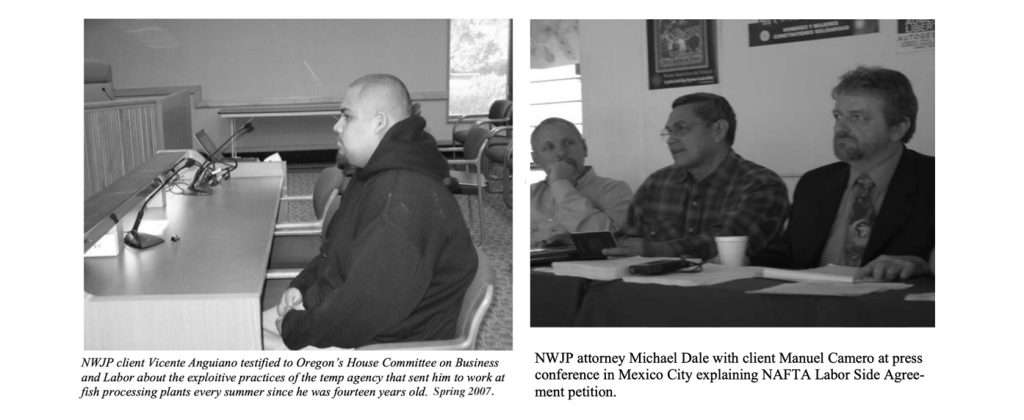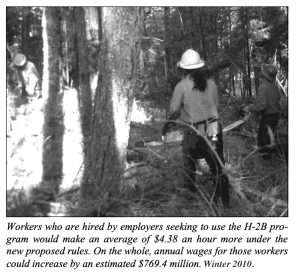Twenty years ago last month, NWJP opened its doors to the public, filling a unique role in the movement for workers’ rights. As we look back on the last two decades of work, we are celebrating our contributions in supporting low-wage and immigrant workers to build power in their workplaces and improve their working conditions.
In retrospect, we can see some of NWJP’s greatest victories and deepest impacts have come over time as we have persistently pushed the leading edge of legal issues important to our client communities. Our movements for economic, immigrant and racial justice need the kind of legal support that steadfastly advances the cause of justice, and NWJP provides that ongoing support for workers.
One important fight that NWJP has been waging, in collaboration with workers and allies, for its entire existence: Resistance to the expansion of predatory and exploitative foreign temporary visa programs. These visas, specifically H-2A visas for foreign agricultural workers and H-2B visas for unskilled temporary workers in other industries, tie the worker’s visa to a particular employer for a season. That means if a worker speaks up about dangerous working conditions, complains of unpaid wages or is injured on the job, the worker may be fired, and is in danger of not getting a visa the next year. Fortunately, due to strong legal and public advocacy, the use of these programs is not yet terribly widespread in Oregon, though it is growing rapidly here.
In areas of the country where temporary worker programs are well-established, work opportunities for domestic workers have largely disappeared, since employers prefer a workforce that, in the words of former Labor Secretary Ray Marshall, works “hard and scared.” It is no accident that 75% of the unpaid wages and civil monetary penalties collected by the Wage and Hour Division of the U.S. Department of Labor are associated with investigation of H-2A employers.
NWJP came into being in the middle of the fight against a bi-partisan proposal sponsored by Oregon’s two U.S. Senators to radically expand the H-2A program and to gut most of its protections. Together with allies, NWJP joined this fight, and this proposal was narrowly stopped.
In April 2005, NWJP Co-Founder Michael Dale filed a petition in Mexico City under the NAFTA labor side agreement on behalf of H-2B forestry worker Manuel Camero, U.S and Mexican human rights organizations and others to complain about workplace abuse of H-2B workers and to challenge H-2B workers’ exclusion from representation from federally funded legal services. This petition began a chain of events that led to the approval in the Congress of an amendment to expand access to legal representation of temporary foreign forestry workers.


Starting in 2009, NWJP helped anchor a national litigation and advocacy effort to challenge and repeal Bush administration regulations that undermined wages and working conditions for U.S. and foreign temporary workers. A U.S. District Court in Pennsylvania ruled that the regulations were unlawful in 2010, and the Obama Administration issued proposed new regulations in March 2011. Over the next five years, NWJP and its allies won additional worker protections and an increased prevailing wage in the new federal regulations, and intervened in and successfully helped defeat employer litigation in the Third, 10th and 11th Circuit Courts of Appeal that sought to overturn them.
 Meanwhile, NWJP has been enforcing the rights of H-2B workers in court, winning cases with forestry workers that confirm their right to extensive compensable travel time, to recover unpaid wages, and to be protected from workers’ comp retaliation. For example, NWJP staff attorney, Mayra Ledesma, and two forestry workers with H-2B visas won a precedent setting court decision in 2022 finding that Oregon’s forestry workers are entitled to pay for the time they must spend traveling on dangerous mountain roads to reach the remote sites where they work.
Meanwhile, NWJP has been enforcing the rights of H-2B workers in court, winning cases with forestry workers that confirm their right to extensive compensable travel time, to recover unpaid wages, and to be protected from workers’ comp retaliation. For example, NWJP staff attorney, Mayra Ledesma, and two forestry workers with H-2B visas won a precedent setting court decision in 2022 finding that Oregon’s forestry workers are entitled to pay for the time they must spend traveling on dangerous mountain roads to reach the remote sites where they work.
 NWJP also has been fighting to ensure that U.S. workers have access to jobs that are offered to H-2A and H-2B workers. The regulations require employers to show that there are no available U.S. workers to take the jobs before they may fill them with temporary visa workers. But, some employers prefer the more vulnerable temporary visa workers and illegally reject qualified local workers. NWJP staff attorney, Alex Boon, and a Central Oregon farmworker are currently fighting this type of discrimination in federal court.
NWJP also has been fighting to ensure that U.S. workers have access to jobs that are offered to H-2A and H-2B workers. The regulations require employers to show that there are no available U.S. workers to take the jobs before they may fill them with temporary visa workers. But, some employers prefer the more vulnerable temporary visa workers and illegally reject qualified local workers. NWJP staff attorney, Alex Boon, and a Central Oregon farmworker are currently fighting this type of discrimination in federal court.
NWJP has taken up the cause of H-2B and H-2A workers, and the local workers who have lost the opportunity to work for H-2 employers, filling a need for some of our most vulnerable and isolated workers. We envision a world where all workers have collective power and access to justice, leading to safety, dignity, prosperity, and equity in the workplace. Workers whose immigration status is dependent on their employer will never be able to fully access that power and justice, and NWJP will continue to fight to include them.
Sincerely,

Corinna Spencer-Scheurich
